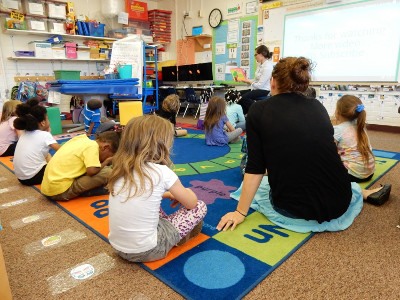
What does it mean to be ready for kindergarten? Most teachers agree on the basics:
That a child can name at least seven colors; that a child knows the alphabet and the sounds that each letter makes; she can recognize and write her name; a child can share, take turns, follow directions and has the self-control to sit still for at least 10 minutes at a stretch.
But it also means that a child sees the connection between the symbol of the 4 and the concept of “four” and that four of something is more than two of something.
Children who are not ready do not demonstrate some comprehension and cannot recall info from stories read. They do not have language skills to understand what is said to them. They cannot follow two- and three-step directions. They do not have the basic understanding that writing has meaning. In math, they have little or no concept of counting and quantity, sorting/comparing shapes, or orally describe simple math concepts.
The Florida Department of Education revamped the way kindergarten readiness is tested last year. Because of those changes, Escambia County appears to have made a nearly 24-point leap in readiness in two years — from 66 percent in 2014 to nearly 90 percent for 2016, based on preliminary data released to VPK providers.
Florida lawmakers in early March 2016 directed the Office of Early Learning not to release readiness data for the second consecutive year. That leaves providers classified as low performing across the state and in Escambia County status quo for another year.
Our report looks into the challenges surrounding kindergarten readiness and making sure our children are ready for school.
In this report
-
Teacher talking to students in classroom
Kindergarten readiness: 'Bright Spots' in improving early education
by Shannon Nickinson
These “Bright Spots” in early education are shining examples of efforts across the country to improve educational opportunities for young children through early education policies and programs.
-
Classroom
Shannon's Window: How T.R. Jackson builds youngsters and their families
by Shannon Nickinson
Helping children succeed in school sometimes includes helping their parents fill the gaps in their own education. And that's how you change lives.
-
Teacher talking to students in classroom
FSU research looks at boosting early reading
by Shannon Nickinson
Researchers at Florida State University have spent six years studying how young children learn to recognize letters, read words and then put them in context to learn to read. It is research that has included children — and teachers — in the Pensacola metro area.
-
Teacher talking to students in classroom
Kindergarten readiness a priority at Lincoln Park
by Reggie Dogan
Lincoln Park Primary School has risen from the brink of closure to become a bright spot in Escambia County School District. Rising from an F to an A based on the state's rating system, Lincoln Park also scored a 100 kindergarten readiness rate.
-
Voluntary Pre-Kindergarten score chart
Escambia County readiness rate scores
by Ron Stallcup
Find out why the readiness rate scores matter.
-
Teacher talking to students in classroom
How readiness weighs on VPK providers
by Shannon Nickinson
As state education officials struggle with measuring kindergarten readiness, VPK providers too face consequences from the uncertainty.
-
Two children reading books in a classroom
Infographic: A VPK Primer
by Shannon Nickinson
A primer at a glance for voluntary prekindergarten.
-
Infographic
Is your child ready for kindergarten?
by Shannon Nickinson
When your big kid is 5 and close to starting kindergarten, this guide can be a checkup to help you see if he’s ready to make the grade for school.
-
Dr. Dana Suskind
Dr. Dana Suskind's journey to advocate
by Shannon Nickinson
MARCH 30: Dr. Dana Suskind, founder of the Thirty Million Words Initiative and one of the nation's experts on brain development and early learning, is coming to Pensacola.
-
Woman reading book to toddler
Changing the rules for readiness
by Shannon Nickinson
At a glance, how kindergarten readiness testing has changed in Florida over the years.
-
Teacher talking to students in classroom
Tune In, Talk More, Take Turns
by Shannon Nickinson
In her book, Dr. Dana Suskind advocates the three T’s — Tune In, Talk More and Take Turns — help baby and toddler brains develop to their full potential.
-
Pockets of Poverty
Poverty's no excuse, but it does matter
by Randy Hammer
The real lesson of FCAT is this: Too many children from poverty-stricken areas show up for their first day of school two and three years behind students who live in more affluent districts.
-
Teacher talking to students in classroom
Florida again struggles with testing readiness
by Shannon Nickinson
Problems with the way kindergarten readiness is calculated at the state level make it hard for districts that want to use the data to do so.
-
Teacher talking to students in classroom
Kindergarten readiness rates stalled another year
by Shannon Nickinson
As the state struggles with kindergarten readiness testing for a second consecutive year, low performing providers of the state's voluntary prekindergarten program remain status quo for another year.
Join Our Newsletter